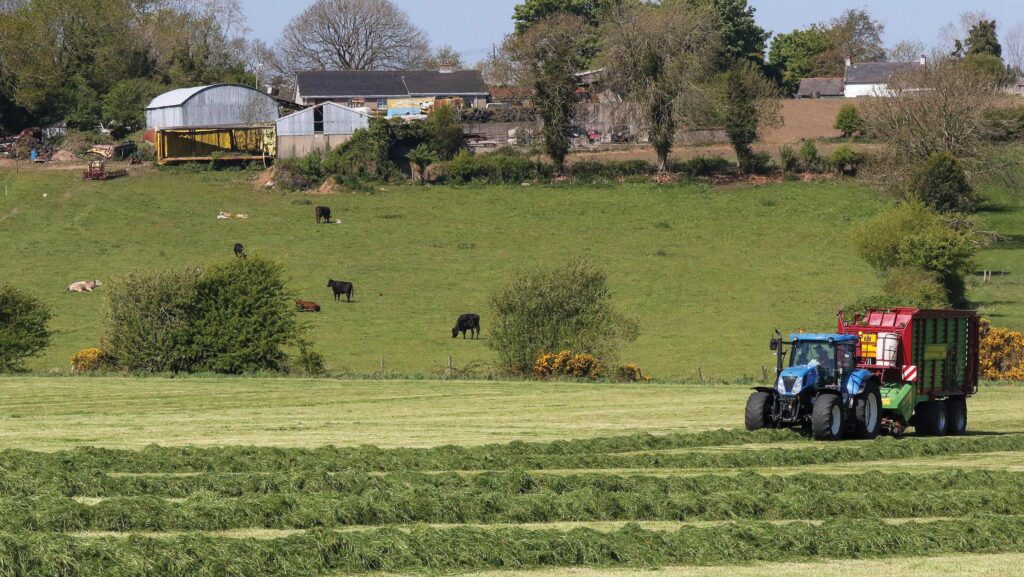NI Sustainable Agriculture Programme – all you need to know
 © CAZIMB/Alamy Live News
© CAZIMB/Alamy Live News Farmers in all four UK countries are under pressure from their respective governments to reduce greenhouse gas emissions, but livestock producers in Northern Ireland (NI) are perhaps shouldering the greatest weight of that ambition.
The economy in NI is underpinned by agriculture – the dairy sector alone processes 2.4bn litres of milk a year.
As such, agriculture makes up a bigger proportion of the Province’s gross domestic product than the industry does to the economies of England, Wales and Scotland.
See also: Proposed pay increases for NI farmworkers announced
Agriculture accounts for a similarly larger proportion of the total greenhouse gases emitted in the country, so while farming is hugely important in financial terms, it is its relative scale which puts it in the firing line for the NI Executive’s environmental aspirations.
Critics suggest the Province lags behind in reducing carbon emissions and that work needs to continue at pace if it is to hit climate change targets.
There is also the matter of Lough Neagh, the UK’s largest lake, with agriculture said to account for 62% of the phosphorus polluting the water.
Campaigners are demanding less intensive farming around the lough, suggesting that the crisis will take decades to overcome.
The stakes for the new farm support scheme are arguably higher therefore than elsewhere in the UK..
NI Sustainable Agriculture Programme
-
Aims to support production levels while improving environmental sustainability
-
2025 Farm Sustainability Transition Payment capped area-based payment (£60,000)
-
2026 Farm Sustainability Payment will replace Basic Payment Scheme
-
Minimum eligibility raised to 5ha
-
Legislation laid for Farming with Nature and Knowledge Transfer Schemes
Beef Sustainability Package introduced includes:
-
Beef Carbon Reduction Scheme cuts target slaughter age to 26 months
-
Suckler Cow Scheme incentives to cut calving interval and age at first calving
Sustainable
The rebranding of the Sustainable Agriculture Programme (SAP) from the Farm Support and Development Programme was announced in January 2025.
NI minister for agriculture, environment and rural affairs, Andrew Muir, of the Alliance Party, suggested the name change better reflected the scheme’s “importance in supporting change for a sustainable future”.
While policies in some European countries have been tailored around cuts to livestock numbers as a solution to achieving environmental targets, the Department of Agriculture, Environment and Rural Affairs (Daera) insists farm output won’t be cut under the SAP.
Instead it says it will be maintained through initiatives to increase productivity and environmental sustainability.
The Ulster Farmers Union (UFU), which represents farmers and growers in NI, largely agrees with that sentiment, broadly favouring some of the schemes already rolled out or being finalised, including the Beef Carbon Reduction and Suckler Cow Schemes.
The Beef Carbon Reduction Scheme, opened in 2024, pays farmers to reduce the slaughter ages of their cattle, with the aim to bring that age down to 26 months over four years.
However, some farmers question if achieving the slaughter age target could create its own set of environmental issues.
But UFU’s deputy president John McLenaghan, whose farm enterprises include beef and poultry, suggests the overall aim for beef farmers to be as efficient as possible will ultimately add to their bottom line.
Fergal Watson

Northern Ireland-based Transition Farmer Fergal Watson’s beef suckler farm on the Ards Peninsula in County Down, will come under the new support regime.
“To achieve those targets farmers will have to feed more meal – meal that is high in phosphates and will therefore be present in cattle manure,” says Fergal.
“That won’t help with environmental goals but actually make the situation worse,” he reckons.
Suckler Cow Scheme
Another scheme in the Beef Sustainability Package, the Suckler Cow Scheme, opened in April 2025 and provides financial incentives to farmers to reduce the age of first calving and the calving interval of suckler cows.
“Encouraging farmers to be more efficient in their business invariably and naturally leads to a lower carbon footprint which ties in with the sustainable aspect of the SAP and the challenges we face nationally and globally around our climate change targets,” says John.
“Being more efficient with the calving interval and bringing down an animal’s first calving date are things that have long been recognised as bottom line improvements to a farming business.”
He recognises that the measures in the Beef Sustainability Package present a greater challenge for beef producers with native breeds.
“It will be more difficult for them to achieve but it is about putting in place a framework that gives agriculture a sustainable future,” he adds.
Payment rollouts
At the end of February 2025, the Farm Sustainability (Transitional Provisions) Regulations (Northern Ireland) 2025 was passed.
This has provided Daera with the legal powers to introduce the Farm Sustainability Transition Payment (FSTP) this year and more general provisions intended to support the roll out of SAP.
A few days later the FSTP opened for applications, capped at £60,000.
This new area payment is designed to provide a “safety net” for farmers and currently accounts for the majority of the support budget, but the payment will reduce as other policies come into play.
The FSTP replaces the Basic Payment Scheme (BPS) and provides a transition to the Farm Sustainability Payment in 2026.
What has changed under the FSTP is the minimum area for making a claim – under the BPS it was 3ha, now it is 5ha.
The regulations agreed in February also provide the legal framework needed to roll out the Farming with Nature and Knowledge Transfer Schemes.
Compromises
The UFU is one of the organisations involved in the co-design of SAP.
John suggests that the schemes worked through so far with bodies representing other interests, including the environment and wildlife, have largely had harmonious outcomes, albeit with some compromises.
“We are positive at this stage and the direction that the SAP is taking our industry,” he says.
There are things UFU would have done differently but he points out that it has been “co-designed, not UFU-designed”.
“We joke with our members that the good bits, the bits that they like are the bits that we did, and the bits they don’t like, someone else or Daera did.
“There has to be an element of compromise, of moving forward together with environmental organisations, that’s a good blueprint and that’s what we have been asked to do by society.”
Another organisation involved in the co-design is the Nature Friendly Farming Network (NFFN).
Cormac Dolan, manager for NI, says NFFN welcomed the minister’s ambitious language.
“We are excited to see what support will be given to farmers on the ground to transition to nature-based farming methods and are waiting to see what budget has been allocated to that.
“We would be the first to say that we can have more resilient farms as a result of practices that are friendlier to nature.
“But it takes risk to go through the transition and farmers need to be financially supported with that, they need the resource to match the scale of ambition.”
Results-based payments
NFFN would like to see results-based payments that reward farmers for their knowledge and experience in delivering improvements to air and water quality and soil health, rather than a “prescriptive approach which can get in the way of things on the ground”, says Cormac.
Farmers should also be trusted to “mark their own homework” on improvements achieved, he reckons.
“We are trusted to do our own tax returns so why not this?” he says.
“A bit of faith in farmers can go a long way. In fact when checks were made on a random sample of farmers in pilots on results-based payments elsewhere, many were actually under-scoring themselves, not overscoring.
“With the right system, the right app and geo-location products our own scheme would be much cheaper and easier to administer.”
There are options in England’s Sustainable Farming Incentive that he would like to see in NI, including payments for planting mixed swards.
“This isn’t available in NI, it should be,” he says.
